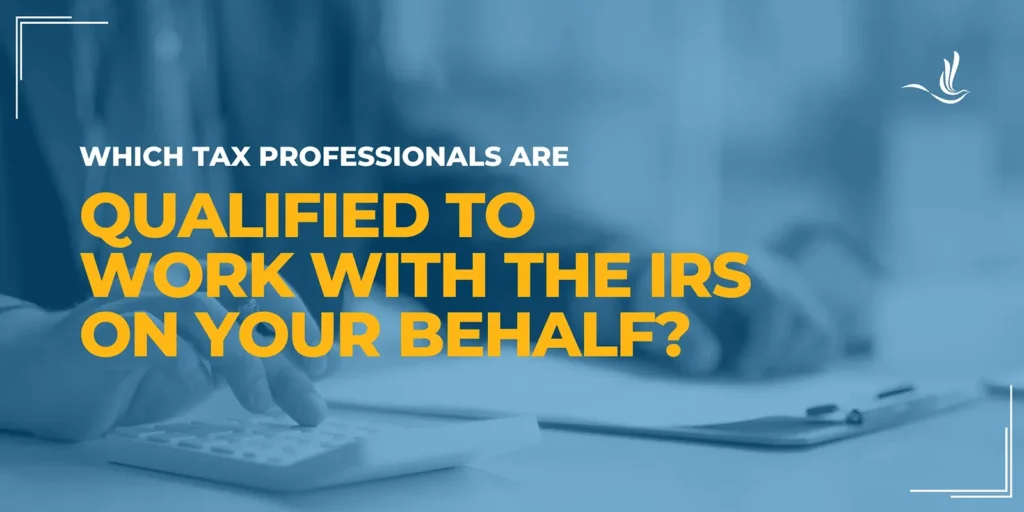
When facing the difficult task of dealing with the IRS, individuals and businesses often seek assistance from tax professionals. These tax pros can help navigate the complexities of tax laws and regulations. However, not everyone is qualified to represent taxpayers before the IRS. So, which tax professionals are qualified to work the IRS on your behalf? The IRS recognizes three primary types of tax professionals who can represent taxpayers before the agency. These are attorneys, certified public accountants (CPAs), and enrolled agents (EAs). Each of these professionals possesses distinct qualifications and expertise, making them valuable assets in resolving tax-related issues effectively. Understanding the different qualifications is essential to ensure proper representation and advocacy in dealings with the IRS.
Tax Attorneys
Attorneys who specialize in tax law are authorized to represent taxpayers before the IRS at all administrative levels, including audits, appeals, and collections. They are licensed to practice law by state bar associations. They’ve also undergone rigorous legal education and training, which may include a focus on tax law.
Tax attorneys possess comprehensive knowledge of tax codes, regulations, and case law. This knowledge enables them to provide expert advice and representation in complex tax matters. They can offer legal strategies to minimize tax liabilities and negotiate settlements with the IRS on behalf of their clients. Finally, attorney-client privilege applies to communications between taxpayers and their attorneys, providing confidentiality and protection against disclosure in legal proceedings.
Certified Public Accountants (CPAs)
CPAs are licensed accounting professionals who have met the educational and experience requirements set by state boards of accountancy. While CPAs are primarily known for their expertise in accounting and financial reporting, many CPAs also specialize in taxation.
CPAs can represent taxpayers before the IRS in matters related to tax preparation, planning, and compliance. They can assist individuals and businesses in responding to IRS notices, resolving tax disputes, and preparing and filing tax returns. However, CPAs do not have the authority to represent clients in tax court or handle certain types of tax litigation, as their training and licensing focus primarily on accounting and financial matters rather than legal advocacy.
Enrolled Agents (EAs)
Enrolled agents are tax professionals licensed by the IRS to represent taxpayers in all matters before the agency. Unlike attorneys and CPAs, who are licensed by state authorities, enrolled agents receive their credential directly from the IRS. They do this after passing a comprehensive examination or demonstrating relevant experience and expertise.
EAs are tax specialists who possess in-depth knowledge of federal tax laws and regulations. They can represent taxpayers in audits, appeals, and collections proceedings, as well as provide tax planning and preparation services. Enrolled agents are particularly well-suited for resolving IRS-related issues, given their specialized focus on taxation and their authority to represent clients nationwide without state-specific limitations.
Choosing the Right Representative
When selecting a tax professional to represent you before the IRS, it’s essential to consider several factors. These might include the complexity of your tax situation, the nature of the tax issue, and the level of expertise required. While attorneys, CPAs, and enrolled agents all have the qualifications to represent taxpayers before the IRS, each brings a unique set of skills and capabilities to the table.
For complex legal matters or situations involving tax litigation, a tax attorney may be the most appropriate choice due to their legal expertise and ability to navigate the intricacies of tax law. For comprehensive tax planning and compliance services, a CPA with a focus on taxation can offer valuable insights and assistance. And for a broad range of IRS representation and advocacy needs, an enrolled agent provides specialized knowledge and nationwide representation.
Tax Help for Those Who Owe
In conclusion, understanding the qualifications and capabilities of different tax professionals is crucial for ensuring effective representation before the IRS. Now that you know which tax professionals are qualified to work the IRS on your behalf, you can decide which to work with. Whether you choose an attorney, CPA, or enrolled agent, selecting the right representative can make a significant difference in resolving tax issues and receiving tax relief. Optima Tax Relief is the nation’s leading tax resolution firm with over a decade of experience helping taxpayers with tough tax situations.
If You Need Tax Help, Contact Us Today for a Free Consultation